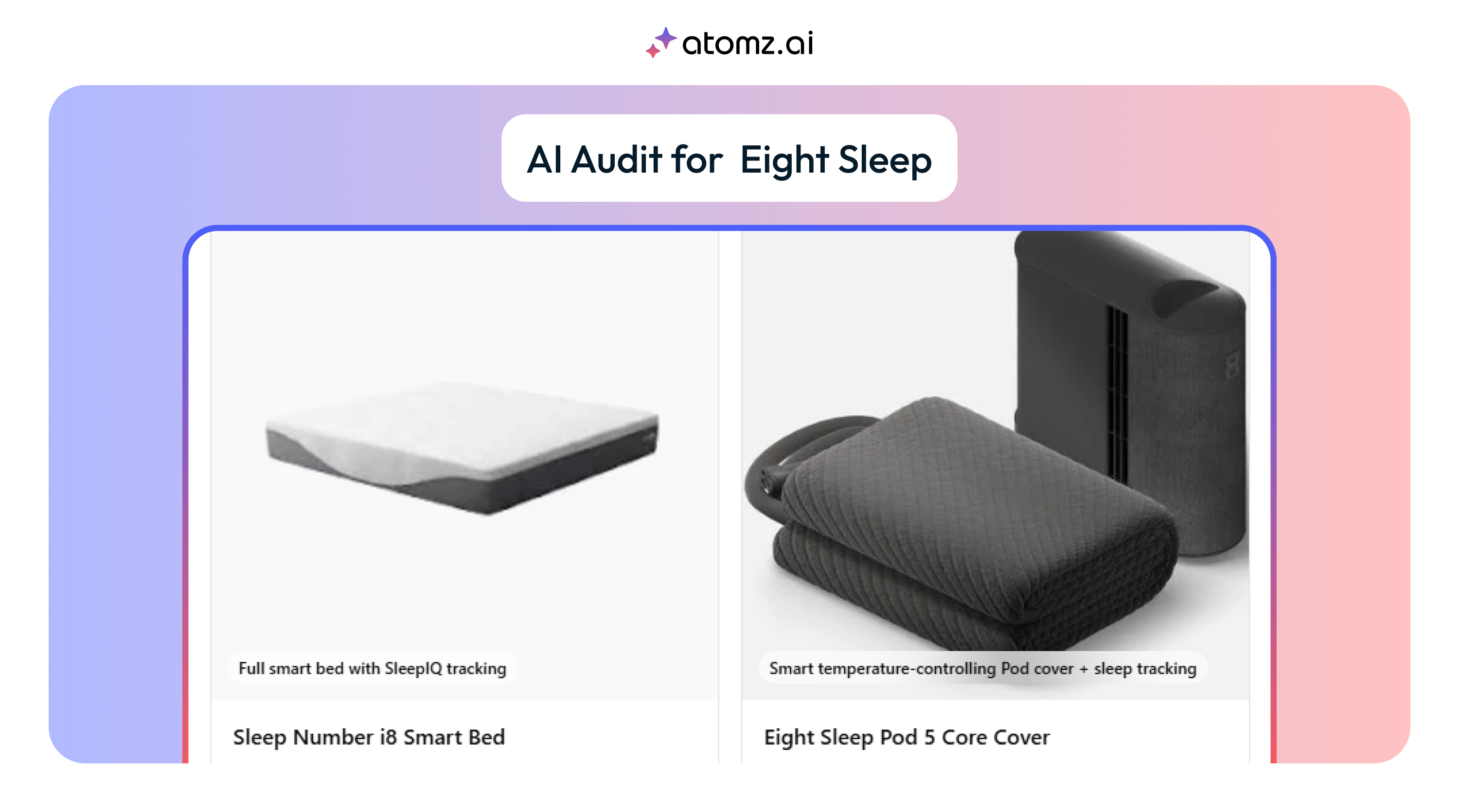
ON THIS PAGE
Stay Updated with latest in AI SEO
04 December 2025
Something caught my attention recently. More people are using ChatGPT to shop for sleep products, but nobody's really testing how tech-forward sleep brands actually show up in these AI-powered searches.
So I decided to run an experiment. I picked Eight Sleep, the smart mattress company that built a premium business around temperature-controlled sleep technology, and tested how visible they are when someone uses ChatGPT to find sleep optimization products.
Eight Sleep appeared in 3 out of 7 purchase scenarios I tested. Despite being a leader in smart sleep technology, they were completely absent from searches like "buy Purple mattress alternative."
Before diving into the Eight Sleep results, you can check your brand's general AI readiness right now.
Test Your Brand's AI Visibility →
Takes 2 minutes. See how your brand performs across different AI systems.
Test how your brand performs across the complete AI discovery spectrum with these 7 strategic queries:
1. Category Authority (2 queries)
Tests: Do you own your product category in AI recommendations?
2. Feature Specificity (2 queries)
Tests: Does AI recommend you for specific product attributes?
Tests: Do you appear when customers seek alternatives?
4. Advanced Features (2 queries)
Tests: How does AI categorize your premium capabilities?
3 out of 7 queries (43% visibility)
Scoring approach: 8+ mentions = strong visibility | 4-7 = mixed results | under 4 = limited visibility
Here's what happened with each search:
Result:
Featured prominently
What appeared:
Sleep Number i8 Smart Bed ($3,524.25), Eight Sleep Pod 5 Core (cover only) ($3,148.00)
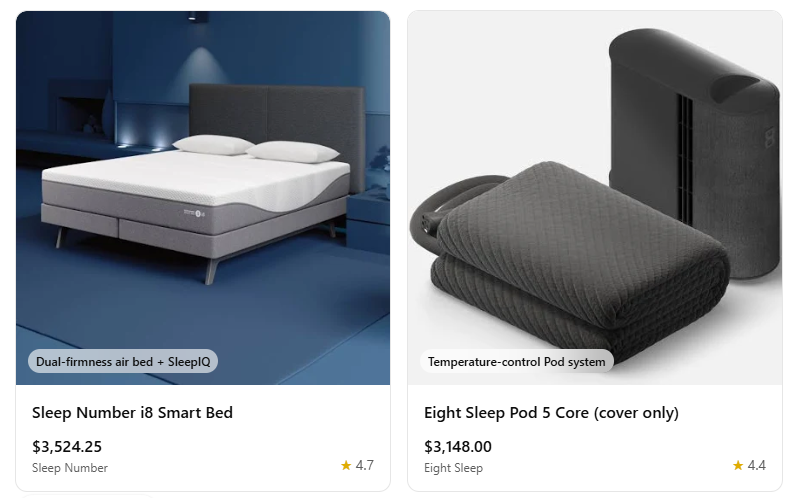
My take:
Strong presence in direct smart mattress searches, positioned as premium option alongside Sleep Number.
Result:
Missing entirely
What appeared instead:
Brooklyn Aurora Luxe Cooling Hybrid ($1,398.75), GhostBed 3D Matrix Luxury Hybrid ($1,899.00), Nectar Classic Hybrid ($469.00)
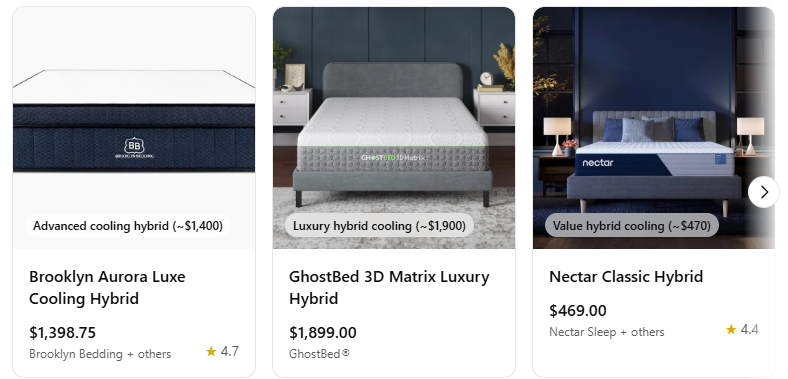
My take:
Eight Sleep's premium pricing ($3,148+) puts them outside budget-conscious cooling searches, missing price-sensitive customers seeking cooling solutions.
Result:
Missing entirely
What appeared instead:
Tempur-ActiveBreeze Medium Hybrid ($19,196.00), Sleep Number Climate360 Smart Bed ($10,249.00), SweetNight CoolNest Mattress ($359.99)
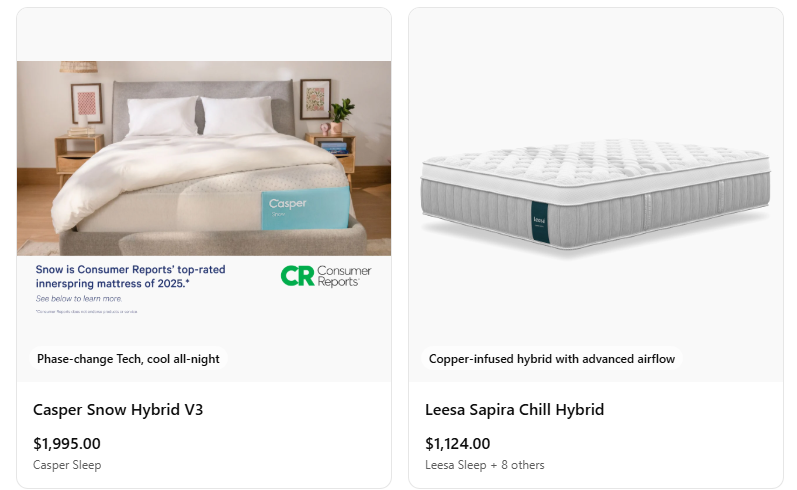
My take:
Surprising absence despite temperature control being Eight Sleep's core differentiator. Traditional mattress brands dominate this specific search.
Result:
Featured prominently
What appeared:
Sleep Number i8 Smart Bed ($3,524.25), Eight Sleep Pod 5 Core Cover ($3,148.00)
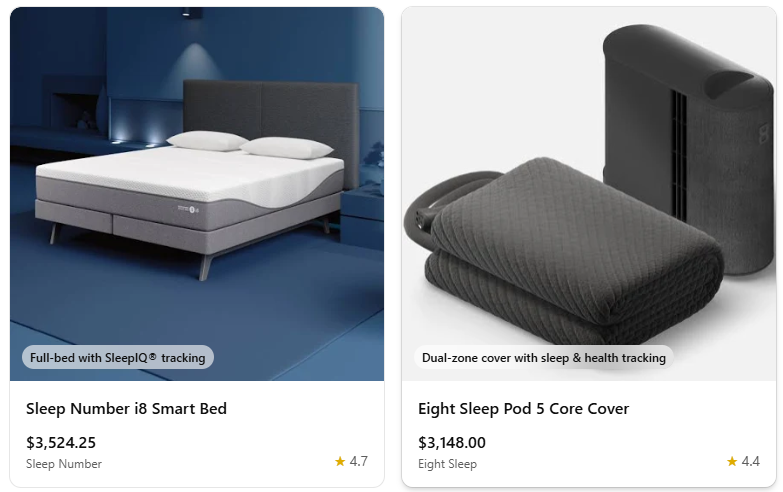
My take:
Excellent performance in sleep tracking searches, positioned alongside Sleep Number as the two main smart bed options.
Result:
Missing entirely
What appeared:
Leesa Sapira Chill Hybrid ($1,124.00), Brooklyn Bedding Aurora Luxe Cooling Hybrid ($699.30), DreamCloud Premier Hybrid Mattress ($799.00)
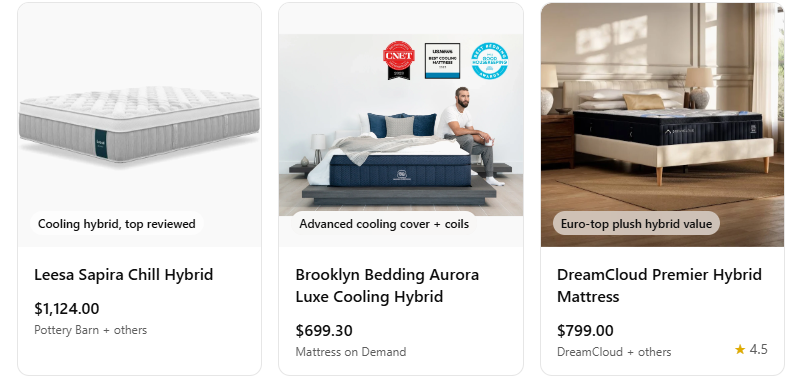
My take:
Eight Sleep doesn't appear as alternative to mainstream mattress brands, missing customers looking to upgrade from traditional options.
Result:
Featured prominently
What appeared:
Eight Sleep Pod 4 Ultra (cover + base) ($2,898.00), Sleep Number m7 Smart Bed ($3,999.00)
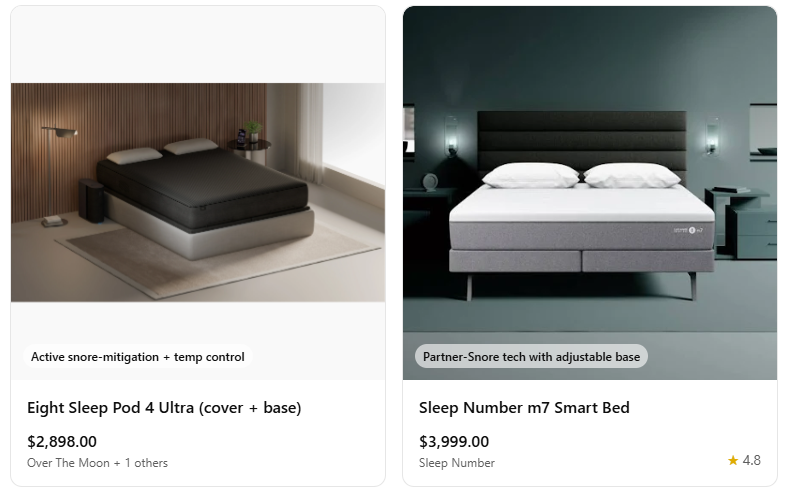
My take:
Strong showing in anti-snore technology searches, highlighting Eight Sleep's advanced features and premium positioning.
Result:
Missing entirely
What appeared:
Sleep Number i8 Smart Bed (mattress + base) ($3,524.25), Tempur-Pedic ActiveBreeze with ProSmart Base ($19,196.00)
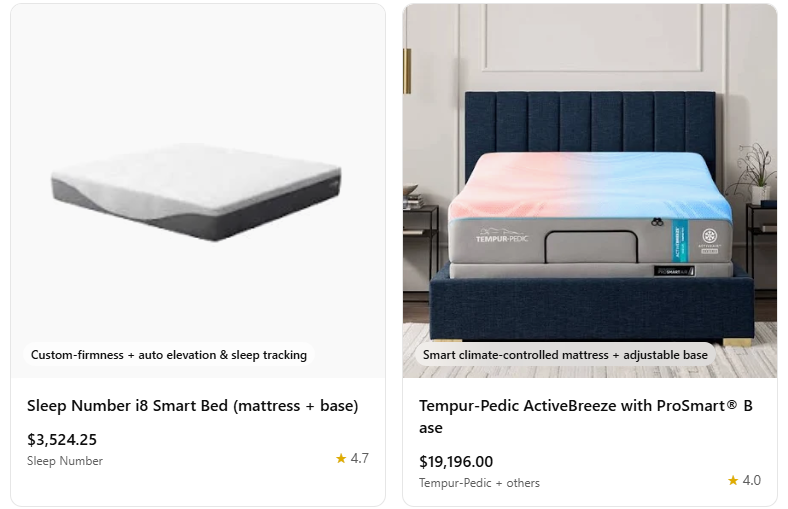
My take:
Sleep Number dominates elevation feature searches, with Eight Sleep absent despite having adjustable base options.
The standout finding: Sleep Number appeared in 4 out of 7 search results, while Eight Sleep appeared in only 3, despite both being premium smart sleep brands.
Why this might be happening: Eight Sleep excels in specific technology-focused searches (sleep tracking, anti-snore) but struggles in broader mattress categories and traditional sleep solutions. Their positioning as a "Pod" system rather than traditional mattress may limit discovery.
Working Theory: Sleep Number's longer market presence and "mattress + bed" positioning may give them broader AI categorization, while Eight Sleep's newer "Pod cover" concept creates more specific but limited associations.
The specialization trade-off: Eight Sleep dominates when searches align with their specific technology positioning (sleep tracking, anti-snore, smart features) but struggles with broader mattress category discovery and alternative positioning.
Category performance breakdown:
The Sleep Number factor: This established brand appeared across smart mattress, sleep tracking, anti-snore, and elevation searches. Their consistent presence suggests ChatGPT strongly associates them with comprehensive smart sleep solutions.
Seeing similar patterns in your industry? Don't guess about your AI visibility.
Check Your Brand's AI Readiness →
See how your brand performs across multiple AI systems. Then manually test the 7-query framework above.
For innovative brands: Being first to market with technology doesn't guarantee AI discovery dominance. Eight Sleep's 43% visibility shows even category innovators have gaps in traditional searches.
For premium tech products: High pricing and technical complexity can limit AI discovery in broader category searches. You need structured product data that clearly communicates benefits beyond technical specifications.
The positioning factor: How you position your product (Pod system vs. mattress) affects AI categorization. Brands with clearer traditional category associations may have discovery advantages.
Learn more about optimizing technical products for AI discovery in our guide: Why 89% of Product Pages Are Invisible to AI
Check your brand's baseline AI visibility. Start here →
Which categories are you missing from? Where do competitors appear instead of you?
Optimize your product information for AI systems. Check our LLM Audit Checklist for specific optimization steps.
Re-run tests monthly to track improvement and catch new patterns.
Based on this research, I've built several tools to help brands optimize for AI discovery:
• AI Readiness Scanner → Test your brand across multiple AI systems
• LLMs.txt Generator → Help AI systems understand your products
• Catalog Genius → Structure product data for better discovery
• AI Search Demo → See intelligent product discovery in action
Want your brand tested?
I'm building a research database of how brands appear in AI discovery systems.
Suggest a brand for analysis →
Testing method:
Fresh ChatGPT-4 sessions, purchase-intent queries, conducted August 6, 2025. This analysis examines publicly available AI responses for research purposes.
Study limitations:
Single AI platform (ChatGPT-4), point-in-time snapshot, purchase-intent queries only. Results may vary across different AI systems and time periods.
Tools used: AI readiness scanner, LLMs.txt generator, and catalog optimization agent for analyzing brand discoverability patterns.
© 2025 AI Brand Intelligence by Atomz. Forward freely, just keep this notice intact.
Streamline your workflow, achieve more
Richard Thomas
Create buying intent instantly
Create buying intent before customers search. 25%+ conversion lift guaranteed.
Why Prompts Matter
AI Search That Converts 3x Better
Get the latest in AI-powered search, UX trends, and eCommerce conversions—straight to your inbo
No spam. Just powerful insights.
👉 Join thousands of growth-focused brands.

